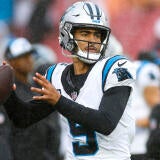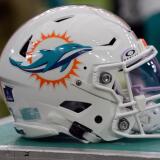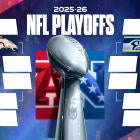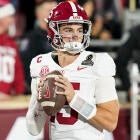
Agent's Take: Here's the contract Lamar Jackson should consider pursuing, though it's not fully guaranteed
Jackson wants a fully guaranteed deal, but after sizing up all the factors, this type makes the most sense
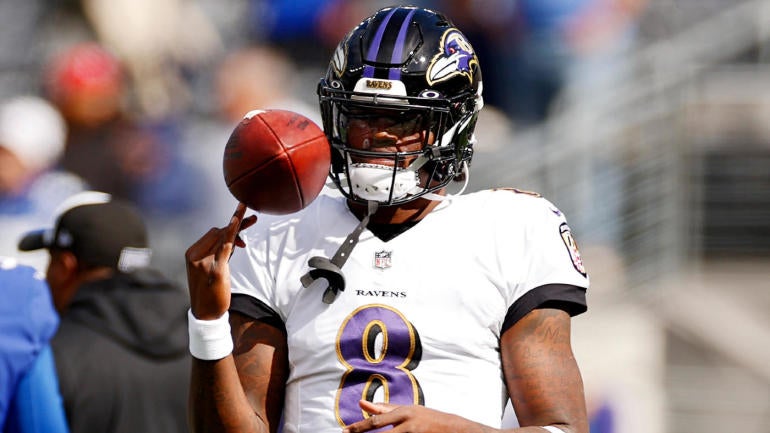
The recent trend is for a quarterback taken in the first round to get a new deal before his rookie contract expires when his team feels comfortable he is the long term answer at the position. In many instances, a contract extension is signed after the quarterback's third NFL season.
Ravens quarterback Lamar Jackson is the exception. He is the only first-round-pick quarterback in this category to play under a fifth year option since the rookie wage scale was implemented with the 2011 NFL collective bargaining agreement.
Jackson, who represents himself, reportedly turned down a five-year extension offer worth approximately $250 million with $133 million fully guaranteed, according to multiple reports, before cutting off negotiations as the start of the 2022 regular season approached. He wants a fully guaranteed contract. Instead, Jackson played on his fully guaranteed $23.016 million fifth year option.
The fully guaranteed five-year, $230 million contract the Browns gave quarterback Deshaun Watson in connection with his trade from the Texans to the Brown last March that Jackson views as a benchmark is an anomaly thus far. ESPN's Jeremy Fowler and Jamison Hensley reported that every proposal Jackson made to the Ravens was for a fully guaranteed contract in excess of Watson's.
The rejected offer had the league's second highest average yearly salary surpassing Broncos quarterback Russell Wilson's $49 million per year. It also had the second most money ever fully guaranteed in an NFL contract. The exact amount of the total guarantee wasn't disclosed at the time. It was believed to have at least been on par with Wilson getting 67.3% of his deal guaranteed. This would put Jackson's total guarantee in the $170 million neighborhood at a minimum.
Negotiations between Jackson and Ravens were expected to resume after the Ravens were eliminated by the Bengals in the wild card playoff round. Jackson is destined for either an exclusive or non-exclusive franchise tag before the deadline to use the designation on March 7 at 4 p.m. ET if both parties remain firmly entrenched in their positions on a fully guaranteed contract.
Missing the last few games of the regular season for a second straight year probably hasn't made the Ravens any more inclined to normalize fully guaranteed contracts by giving Jackson one. The PCL sprain in Jackson's left knee that sidelined him after 12 games last season has likely increased any concerns Baltimore has about his durability, which cuts against a fully guaranteed deal.
The likelihood of other fully guaranteed contracts
It may be useful for Jackson to attempt to make an honest assessment of whether the quarterbacks who could potentially sign lucrative extensions this offseason will help his cause. The Ravens will surely do that evaluation.
The Eagles are one of the NFL's most proactive teams in locking up core players well in advance of free agency. There would have to be a huge disconnect between the Eagles and Jalen Hurts for a deal not to get done. A fully guaranteed contract is likely a deal breaker for Eagles owner Jeffrey Lurie.
Signing 2020 first overall pick Joe Burrow to an extension is a top offseason priority for the Bengals. Burrow will likely encounter heavy resistance to a fully guaranteed contract.
The Bengals are in the dark ages when it comes to structuring contracts for veteran players. The only guaranteed money in Cincinnati veteran contracts is a signing bonus and a roster bonus payable within a few days of signing.
The bigger deals contain a third or fifth day of the league year roster bonus in the second and third years. The roster bonuses are supposed to be substitutes for additional contract guarantees. The overall guarantees in Cincinnati contracts are usually less than comparable deals on other teams.
Expect the Bengals to establish a new contract precedent with Burrow as the Steelers did with edge rusher T.J. Watt in 2021 on a four year extension that made him the league's highest paid non-quarterback. The Steelers also refused to have traditional salary guarantees in veteran contracts until Watt's.
Chargers general manager Tom Telesco recently stated the obvious by declaring that he wants 2020 sixth overall pick Justin Herbert around for a long time. As a family run business, the Chargers aren't considered a cash rich team. Herbert's signing bonus in his rookie contract wasn't paid in a lump sum and a small portion was deferred to March 2021.
Meeting the NFL's archaic funding rules where teams are required to put into an escrow account the amount of any guarantees in a contract other than those just for injury, including ones in future contract years, could be problematic for the Chargers. Herbert getting a fully guaranteed contract seems like a stretch given how his signing bonus was paid and the funding rules.
Ravens concessions necessary to forego a fully guaranteed contract
Jackson standing on principle for a fully guaranteed contract has been admirable, but it is unlikely that the upcoming quarterback market developments will be beneficial for him in this regard. Under the right circumstances, Jackson should seriously consider giving up his quest for a fully guaranteed contract. Doing so would likely close the door on other veterans getting fully guaranteed contracts for the foreseeable future.
Knowing the ramifications of accepting a traditional deal, the only way Jackson should make such a monumental concession is if the Ravens meet his demands in nearly every other important aspect of the contract.
Becoming the NFL's highest paid player would be a requirement. That distinction belongs to Packers quarterback Aaron Rodgers. Once Rodgers, who was entering a contract year, decided he wanted to remain with the Packers rather than try to force a trade, he became the NFL's first $50 million per year player last March. His contract is widely considered to be $150.815 million over three years, although there are two additional years well below market value in the deal.
A four year deal would seem to be appropriate, given the situation. Being best positioned to take advantage of the expected significant salary cap growth in the coming years thanks to new media rights deals reportedly worth $113 billion over 11 years and an influx of gambling revenue would have increased importance without a fully guaranteed contract.
The most common contract length for high end quarterback contracts before the Chiefs signed Patrick Mahomes to a 10-year extension in 2020 when he had two years remaining on his rookie contract was four new years. Mahomes became the NFL's first $40 million per player with his $45 million per year extension. Besides Rodgers' four year extension with the Packers in 2018, Jared Goff, Carson Wentz and Wilson signed extensions of the same length respectively with the Rams, Eagles and Seahawks in 2019.
The first big quarterback deal after Mahomes was Watson's four year extension averaging $39 million per year with the Texans right before the start of the 2020 regular season. Dak Prescott continued the trend when he became the league's second $40 million per year player the following March after playing under a franchise tag in 2020 by signing a four year contract worth $160 million with the Cowboys.
A couple of elements would need to be borrowed from Prescott's contract for a deal that isn't fully guaranteed to make sense from Jackson's perspective. The largest signing bonus in NFL history would be necessity. It's currently Prescott's $66 million.
The first two years of Jackson's contract, 2023 and 2024, would need to be fully guaranteed at signing as well as and a substantial portion of 2025. The remainder of Jackson's 2025 salary would have to be guaranteed for injury at signing and become fully guaranteed next March during the first few days of the 2024 league year. There wouldn't be any guarantees in 2026, the final year of the contract.
Another important component of the deal would be a clause preventing the Ravens from using a franchise or transition tag when the contract expired after the 2026 season. This type of clause is rare in NFL contracts. Prescott is the only quarterback among the 10 highest paid players in the NFL with one.
A no trade clause would also need to be a part of the contract. Most of the quarterback contracts averaging $35 million per year or more contain one.
A contract that isn't fully guaranteed would need to have an extremely player friendly structure. The best four year contract cash flow belongs to cornerback Tre'Davious White in the extension he signed with the Bills in 2020 that briefly made him the NFL's highest paid cornerback.
Baltimore's treatment of tight end Mark Andrews would be a factor. The cash flow percentages in the four year extension averaging $14 million per year Andrews signed right before the start of the 2021 regular season is far superior to the cash flow percentages of the other highest paid tight ends with deals of the same length. It sticks out like a sore thumb. Andrews' extension made him the NFL's third highest paid tight end upon signing.
Prescott's structure would be relevant because of being a quarterback where the franchise tag dynamic came into play. Since Watt became the salary standard for non-quarterbacks, his contract would be applicable as well.
The chart below compares the cash flow percentages of the four players after each new year of their contracts.
| Player | 1st new year | 2nd new year | 3rd new year | 4th new year |
|---|---|---|---|---|
Mark Andrews | 47.32% | 60.71% | 80.36% | 100% |
Dak Prescott | 46.88% | 59.38% | 78.75% | 100% |
T.J. Watt | 44.56% | 62.41% | 81.26% | 100% |
Tre'Davious White | 52.05% | 66.76% | 81.83% | 100% |
Averages | 47.18% | 61.71% | 80.21% | 100% |
The average cash flow percentages for the quartet are similar to Andrews'. The Ravens would have a hard time justifying to Jackson that his deal shouldn't be equal to or better than Andrews' structurally.
Suggested contract
The following provides a sense of what would Jackson's deal might look like after factoring these contractual elements into the equation.
Length: 4 Years
Average yearly salary: $52.5 million
Total: $210 million
Overall contract guarantees: $170 million
Fully guaranteed at signing: $150 million
Signing bonus: $85 million
First-year cash: $99 million (47.14%)
First two years cash: $130 million (61.9%)
First three years cash: $170 million (80.95%)
Putting the suggested contract into context
The $52.5 million average yearly salary is a slight bump over Rodgers' $50,271,667 per year. The 4.43% increase doesn't completely account for salary cap inflation. The salary cap is going up 7.97% from $208.2 million in 2022 to $224.8 million in 2023. When Rodgers' deal is adjusted for salary cap inflation, it averages a little more than $54.275 million per year.
Jackson's time at the top of NFL's salary hierarchy would likely be short-lived if he got his deal done before Burrow. The Bengals have already established a precedent of making a potential franchise quarterback the league's highest paid player. It was done with 2003 first overall pick Carson Palmer when he signed a six-year extension averaging $16,166,167 per year right before the end of his third regular season in 2005. Rookie contracts could be extended after two years back then. Burrow is the more accomplished quarterback of two Bengals at similar stages of their respective careers.
An $85 million signing bonus is a healthy increase over Prescott's. Percentage wise, it is on par with how much Prescott's signing bonus was of his total contract value. The suggested signing bonus is 40.48% of Jackson's total deal. Prescott's was 41.25%.
$150 million fully guaranteed at signing is a significant improvement over the $133 million that was rejected last year when negotiations ceased. $170 million in overall guarantees would be the second most ever in a NFL contract. That's currently Wilson with $165 million.
Cardinals quarterback Kyler Murray has $160 million guaranteed for injury at signing that can become fully guaranteed at a various dates in the five-year extension averaging $46.1 million per year he signed at the end of last July. An additional $29.5 million in latter years of Murray's contract ($10 million in 2026 and $19.5 million in 2027), which is unguaranteed, can also become completely secure to bring the total amount that can be guaranteed to $189.5 million.
An inability to prevent Jackson from hitting the open market in 2027 because of the no franchise/transition tag clause would ensure him maximum leverage in any subsequent contract talks. There would be pressure for the Ravens to reach an agreement when Jackson is entering the final year of his deal in 2026 if keeping him was the objective. For all practical purposes, Jackson would essentially have a three year deal averaging $56,666,667 per year before getting "another bite of the apple" after the salary cap started skyrocketing.
Final thoughts
I doubt this type of concept is going to appeal to Jackson (even though it should) since he appears to be narrowly focused on a fully guaranteed contract. Barring a drastic change in position by one of the parties, the next step is for the Ravens to decide whether to use an exclusive or non-exclusive franchise tag on Jackson.
The non-exclusive designation for $32.416 million would be Jackson's best immediate chance for a fully guaranteed contract. The Ravens would be vulnerable to an offer sheet from a quarterback needy team where there would be reluctance to match.
The two first round picks for Jackson would be considered an inadequate return. Non-quarterbacks, such as safety Jamal Adams, cornerback Jalen Ramsey and offensive tackle Laremy Tunsil, have been traded for more than two first round picks in recent years. The exclusive tag, which currently projects to $45.248 million, seems more likely precisely because of this.
There is a school of thought that Jackson should sit out the 2023 season rather than play under either franchise tag if it comes to that. Forfeiting as much as approximately $45 million would be an interesting business decision given Jackson's career earnings from his NFL player contract. Jackson has made just under $32.5 million in five NFL seasons. The exclusive franchise tag would be about 40% more than Jackson's football career earnings. It also remains to be seen whether signability issues because of the fully guaranteed contract demand will eventually lead to the Ravens exploring a trade with another impasse in negotiations.

